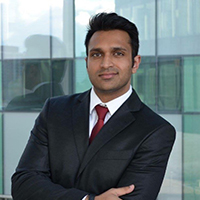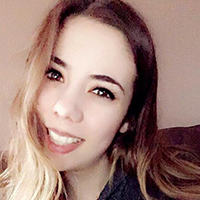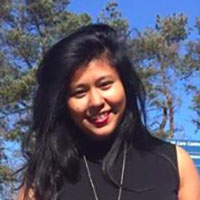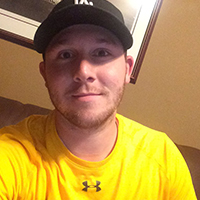
Yusuf Bulbulia
Majors: Political Science & History
What factors contributed to you choosing your program(s)?
I decided to choose my program purely based on my passions and interests. I asked myself in first year: Why do nations go to war? and what solutions can do we have to prevent us from going into a third World War? these questions have loomed over me throughout my undergrad. I choose History to understand why nations went to war and Political Science to understand how can we find solutions. I met a gentleman prior to starting University, who told me to "select a program based on your interest, and not what's gonna get you a job" This is only the beginning to a long road ahead.
Can you describe your program(s)? What is it actually like?
I am truly humbled and privileged to have been given the opportunity to learn from the top Academics and do research under excellent scholars. History and Political Science are both very reading intensive, discussion based, and critical thought. Classes require a lot of dedication and work ethic is the main ingredient to make this recipe work well. I have been fortunate to have learnt this early on in my undergrad, and it has led me to become top scholar and I have been the recipient of numerous awards due to it. My program's taught me about myself, and I approached each topic, essay, and project as if it was a master’s thesis. This led me to Publish in undergrad and helped me develop a passion about what I was learning.
What tips/advice can you provide to students just starting or considering this program(s)?
Always ask for help when you don't understand something - This is very hard for most student's and it's the students whom admit they don't know something are the ones who tend to flourish. Always maintain an open mind, develop a curiosity, and challenge every idea presented. The road ahead is not an easy one, it will be tough, and challenge you in every way possible- Select classes based on your interest, strengths and develop relationships with Professors. This can make the difference that's what is needed to succeed.
What will you do with your degree after graduation? (Future plans?)
I plan on furthering my education and likely going into a MA/PhD program either in Canada or the United States.
What has your academic journey during your time been like as you progress toward graduation?
My Academic Journey has developed overtime. I was never the "top student" or "valedictorian" in High School. I was the very average student, who was lost, and unsure about university. My first year changed everything for me - I went through the initial adjustment period and slowly started to find my niche, I was lucky to have met Professors who ended up supervising my entire undergrad and who have been great mentors to me. My second year, was where everything changed completely. I achieved greatly at the end of my second semester in first year, and second year was where I found passion in the subjects. I was confident in speaking in front of a class of 300 students. Third year, I was began thinking about the next steps and where I saw myself in the program and began determining my next move. I had just been named on the Dean's list for my performance in Second year and took initiative in assisting the running of a club known as - Model UN. I had found the overlap between my Academic Passions and "bridged theory and practice". I am now in my fourth year and have looked back on my time at UTSC with "no regrets" having achieved more than what I ever expected. I thank the UTSC community for making my journey very memorable, Professors - Matt Hoffmann, Jo Sharma, Phil Triadafilopoulos, and Franca Lacovetta. These Professors helped me reach my highest potential in my first three years and helped me become a better student, adult, and scholar.
Cailen English-Sufrin
Major: HistoryMinors: Sociology and Political Science
What factors contributed to you choosing your program(s)?
History has always been something I loved and I really started to think about studying it while in grade 10. Teachers and Professor can very easily make or break the class and I think it takes a very specific person to make history outside of independent study fascinating. I was lucky enough to have great teachers that really were helpful in developing my passion for historical studies. As for sociology and political science I really chose to study those just by experimenting with my interests and found that not only were these programs interesting I was also good at them.
Can you describe your program(s)? What is it actually like?
It's a lot of reading and a lot of content and it can be a little overwhelming at points. I think it's important to know that first year is so broad and all-encompassing that it's easy to be overwhelmed when you need to learn about hundreds of thousands of years of history in one course (HISA04/CLAA04) but it's only first year. If you stick with it second year courses really allow you to specialize in courses that you're truly interested in.
What tips/advice can you provide to students just starting or considering this program(s)?
Don't be too concerned about 1st year. Try your best but don't get discouraged and stick with it. University especially programs that are more objective are easy to be overwhelmed by. Learn how to study efficiently and don't spend hours upon hours trying to learn a concept, take your time, take breaks, don't worry if you watch some Netflix refresh your mind and continue later. Don't burn yourself out because it won't help you in the long run. Finally, try to make connections and critiques that aren't necessarily part of the course, question professors if you think something is iffy.
What will you do with your degree after graduation? (Future plans?)
I plan on applying for grad school in the future but after I graduate I plan on volunteering and really learning about who I am and what I want to do with my life.
What has your academic journey during your time been like as you progress toward graduation?
I didn't really try my first year. I did poorly in a class or two but looking back I'm not upset or disappointed because I enjoyed university and made lots of friends and connections. By my second year, I started to focus on my grades and obviously made huge improvements but I still had those relationships which made university less intimidating and fun. I feel like by my third and 4th years I really understood what I was meant to take away from each class and have definitely seen an improvement in my research and essays and over all grades. Now in my 5th year, I definitely feel more confident in my writing and critical thinking.

Erica Sylvia Prout
Major: HistoryMinors: Classical Studies and French
What factors contributed to you choosing your program(s)?
I fell in love with history after having an amazing teacher in high school who inspired me to pursue my passion for learning. Growing up I thoroughly enjoyed the Percy Jackson series by Rick Riordan and quickly became obsessed with all things Greek. I knew that I while I loved all eras of history. I really wanted to focus on the classical world and was pleased to find out that UTSC offered a minor in classical studies that paired very nicely with my history major.
Can you describe your program(s)? What is it actually like?
The classical studies program is basically the same as the history program just with courses that focus on the classical time period. What's great is that a lot most classics courses double as history courses so I was able to fulfill both requirements with one course. For example, Introduction to Greek History can and will count towards both degree requirements so it's like killing two birds with one stone as they say which I enjoyed quite a bit because it gave me the room to venture out and take more elective courses. For those thinking about a history and/or classics degree keep in mind that the programs are reading and writing intensive. Having so many readings to do every week may seem overwhelming but it's definitely worth it and you will see results in your final grades.
What tips/advice can you provide to students just starting or considering this program(s)?
Try to keep up with the readings, you don't want to fall behind and then feel lost during the lecture. The university experience is more than just listening to your professor talk and taking notes. If you want to succeed it is a good idea to read the material before coming to class. Also, do not be afraid to speak up, the professors love it when you do. Definitely start your assignments early, some of your essays will be double digit pages in length and you do not want to be doing it the night before, it will reflect the grade you receive. If you are looking on continuing your degree with a masters in classical studies, most schools require you to have taken Latin and Ancient Greek, that is something I wish someone had told me when I was in first year.
What will you do with your degree after graduation? (Future plans?)
Right now I am looking into furthering my education with a master’s program in Classical Studies with the end goal to work in a museum and share my love of the classics with the public.
What has your academic journey during your time been like as you progress toward graduation?
In first year I didn't know what I was doing, no one does. But I made some pretty great friends and we stumbled through university together. The transition is hard I will admit; it is highly unlikely that you will receive the same grades that you did in high school but don't let that discourage you. Second year you get comfortable with the routine of it all. Professors expect a little more from you now that you have had time to adjust. Third year was the hardest for me. Now is the time to get your act together as grad schools look at not only your final year but your third as well. This is the time to really push yourself to do the best you can. Now I am entering fourth year and I remind myself constantly to take things one step at a time. Four year is your finally chance to show what you can do, always try your hardest.

Fateha Hossain
Major: International Development Studies
Minors: Food Studies and History
What factors contributed to you choosing your program(s)?
When applying to UTSC, I entered into the International Development Studies (IDS) Co-op program, but by the end of my second year, I decided to complete a major in International Development Studies, and two minors in History and Food Studies. The IDS Co-op program provides an amazing opportunity for students to apply their knowledge in the field during their co-op placement. However, in my second year, I worked on a research project called Scarborough A Little Taste (SALT), which is an online website that highlights prominent cuisines in Scarborough, and through taking food studies courses at UTSC, my research interests grew into understanding the intersection between local development and the role that food played in addressing those issues. As such, I found that the combination of studies that I am currently pursuing allows me to cultivate my research interests, craft a set of useful skills, and provide a more robust foundation to understand the world around me.
Can you describe your program(s)? What is it actually like?
I would say that my programs complement each other quite nicely, so when trying to understand certain concepts or write essays about particular subjects, I find the things I learn in my other courses help to enhance my learning. Like many other humanities or social sciences programs, there is a lot of writing, but the help that I’ve received in trying to make sense of what I’m trying to research or understand is useful and appreciated. I find that my History minor teaches me the importance of analyzing things with a historical perspective, and is my opportunity to explore courses outside of my core research interests. Another aspect that I truly enjoy is the opportunity to engage fellow students in discussions about topics that I learned in other courses in order to understand their perspectives. The connections I am able to develop with friends and professors make what I’m learning more enjoyable and accessible, and partaking in various research work-study projects also helps to enhance my learning.
What tips/advice can you provide to students just starting or considering this program(s)?
- Try to attend some of the events being organized by the department(s) and its student associations/clubs.
- Get to know your professors and teaching assistants, and maintain that relationship, even after you’re finished the course.
- Ask about research or work opportunities from professors and teaching assistants, or look on CLN (cln.utoronto.ca) to see if there are any postings that relate to your program/research interests, and then apply for them!
What will you do with your degree after graduation?
To be quite honest, I don't have anything planned very specifically, but some of the directions I'd like to pursue are in food policy, further research, and community development. I believe that by taking the opportunities that are presented to me that I feel passionate about; I will be able to remain flexible and open in my endeavours.
What has your academic journey during your time been like as you progress toward graduation?
In first year, I took on a full course load along with a work study position and another part time job, and because of certain family situations going on at home, my struggles had more to do with my emotional well-being. Though my grades were not as satisfactory as I would have hoped, making that adjustment from high school to university encompassed more than just being a good student. It showed me the importance of prioritizing my well-being, general time management skills, and that ultimately, grades do not determine my self-worth. In second year, I incorporated more history and food studies courses into my studies such as HISB14 - Edible History: History of Global Foodways and WSTC24 - Gender in the Kitchen, which I found helped me to navigate my research interests. However, because of a very intensive workload, in the second semester of my second year, I took a part time course load which I found to be much more helpful. Taking that slight break helped me to refocus and reflect, and again, prioritize my well-being. Now having completed the first semester of my third year with a full course load, I took a research and writing course called Critical Writing and Research for Historians (HISB03) that helped to identify areas of strength and improvement in my research skill set. The course called the International Development of Food (IDSC14) also helped to bridge International Development Studies and Food Studies by illuminating the connections, issues, and theorists whose work ties those two fields together. Looking forward, I hope to continue practicing emotional resilience and developing my time-management and other skills, while finishing my studies.

Marcus Rozsa
Major: Human Geography
Minors: History and Sociology
What factors contributed to you choosing your program(s)?
I have always been interested in the relationship between humans and their immediate geographic context, and how that differs from place to place depending on factors such as social values, governmental policies, and the historical past of such places. Through the diversity of their course offerings, the department of Human Geography allowed me to explore these concepts in an elaborate manner.
Can you describe your program(s)? What is it actually like?
As just briefly alluded to, Human Geography is extremely wide-ranging. The department offers courses focusing on broad issues such as our own understanding of the environment, how power is distributed throughout urban regions, and how education differs depending on geography. However, the department also offers courses that narrow in on specific topics, including the development of the Toronto region, and land reform in South Africa. In all, each course will ultimately focus on the relationship between people and place, in both abstract and legitimate terms.
What tips/advice can you provide to students just starting or considering this program(s)?
- Keep an open mind. Human Geography courses will challenge you to understand material through a number of different lenses. Keeping an open mind will make this process much easier.
- Keep up with the readings. Reading, while not overwhelming, provides a whole new layer of insight that assists in clarifying lecture material. Succeeding in class becomes immensely easier when you supplement lecture material with reading material.
What will you do with your degree after graduation? (Future plans?)
I will be attending law school beginning next September.
What has your academic journey during your time been like as you progress toward graduation?
I actually began my post-secondary academic journey at a college in Ohio playing baseball on a scholarship. While not declaring a major there, I did take a number of geography courses which originally sparked my interest in the field. After transferring to UTSC and entering the Human Geography program, the courses I was taking were exactly what I was looking for. They were both mentally stimulating and very enjoyable. Admittedly, it did take about a semester for me to adjust from a college curriculum to a university one, but I did eventually adapt to the learning style, and eventually began to excel in it. I am now in my final semester at UTSC.